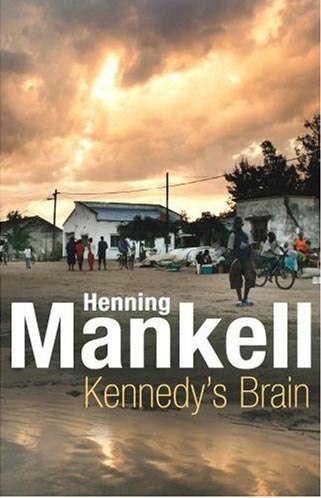
EURO CRIME
Reviews

Mankell, Henning - 'Kennedy's Brain' (translated by Laurie Thompson)
Hardback: 336 pages (Sep. 2007) Publisher: Harvill Secker ISBN: 1846550300
When archaeologist Louise Cantor's son, Henrik, is found dead in his bed in Stockholm, she refuses to accept the police's verdict of suicide. Of course, this is a mystery novel, so the reader, based on previous experience of such affairs, feels wise to side with her. Louise gives up her commitments to a dig in Greece, and embarks upon a messy, mother's-grief-fuelled quest to find out the truth. It's a quest that will lead her back to Henrik's enigmatic, almost hermetic father, to Spain, and then to the AIDS-riddled communities of Mozambique, where a mysterious benefactor is funding help efforts. On the way there, she must contend with the puzzle thrown up by Henrik's extensive clippings and investigations into the conspiracy concerning President Kennedy's missing brain.
KENNEDY'S BRAIN is a very odd chestnut. Louise's somewhat messy but nobly-motivated questing proves a good metaphor for the whole book, in fact: motivated by righteous anger but executed with a bit of a muddle.
Mankell has always had an eccentric style, and with the Wallander stories and his occasional standalones, he has always plotted so superbly and created such engaging characters that that eccentricity works well with those strengths. Here, though, something's off. The plotting is in fact a bit of a muddle, and the atmosphere doesn't quite work. Louise's intense grief is supposed to arouse, one supposes, empathy and drive, but instead it bogs things down. The constant protestations of grief get tiresome, and rather than create urgency they almost overwhelm to the point of catalepsy. The plot kicks along in starts, somewhat perfunctorily at times, not feeling particularly fleshed out in terms of what has actually happened. Yes, he perfectly creates the sense of some kind of malevolence, and eventually we find out what that is more specifically, but there's little detail. Especially concerning a character's disappearance which seems odd from the very page it happens: thrown in just to give Louise something more to puzzle over but which increasingly seems to go nowhere.
At one point, one character says of another: "he could sometimes be a bit high-flown, but he really meant it", and that also sums up this book very well. Occasionally the prose is high-flown (Mankell is a great one for planting melodramatic thoughts and scripting high-flown dialogue), some of the plotting is a little odd, and overall bits of it feel underdeveloped (while others are crafted in great detail), but when the pen is laid down, you know this was motivated by strong feeling, and has noble motives. Mankell really means this, and is really impassioned when he is able to hit upon the AIDS topic. The scenes at the hospice are among the best in the book. You know - if you didn't already - this is a topic close to Mankell's heart, but that it is so close means that bits of the book feel forced out so he can plot a novel round the issue.
The book has its strengths: Louise is fascinating, when removed from her sadness, and Mankell's crusading is powerful, as is his evocation of place and atmosphere. But the mystery elements are sketched scantily, and overall it doesn't come together too well as a thriller. It's a noble but flawed book (and the title, which reflects an obsession of Henrik's, is irritatingly irrelevant, and that obsession, annoyingly, only symbolic) though I would say it is worth reading for its strengths, and the fact that it's Mankell.
Read another review of KENNEDY'S BRAIN.
Fiona Walker, England
September 2007